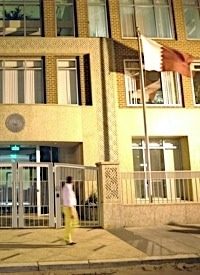
Speaking on condition of anonymity, a U.S. State Department official said that Mohammed al-Madadi will likely be transferred or even sent home, following his disruption of United Airlines Flight 663 on Wednesday, April 7. The Department has conveyed the seriousness of the matter to the Qatari government. Al-Madadi is the embassy’s “third secretary” to the United States. Though a relatively minor position it remains a coveted one, and as he was flying on official business it also granted him diplomatic immunity.
The Boeing 757 was carrying 157 passengers and six crew members, United Airlines spokesman Michael Trevino said. The flight left Reagan National Airport at 5:19 p.m. EDT and landed at Denver International Airport at 7 p.m. MDT.
Shortly before landing, al-Madadi entered the restroom. Government sources said flight attendants notified federal air marshals on the plane when they noticed the emittance of smoke. Al-Madadi identified himself as a diplomat from Qatar when the marshalls asked what he was doing. Accounts differ as to whether he made a remark to the effect that he was trying to light his shoes on fire, or actually put the cigarette out on his shoe. Either way, in the wake of the 2001 “shoe bomber” Richard Reid, and the more recent attempt at Christmas of a terrorist passenger attempting to blow up a plane heading for Detroit, the marshals took no chances with Al-Madadi. He was taken into custody and two F-16 fighters, scrambled by the North American Aerospace Defense Command (NORAD), intercepted flight 663 and escorted it to Denver.
Tim Burney, a passenger sitting one row in front of the diplomat, recounted, "I didn’t know anything had happened until we landed." Burney was able to overhear a marshal telling the suspect, “just be honest with me.” Al-Madadi responded something about being “embarrassed.” No struggle took place according to witnesses, who said the suspect and a U.S. air marshal were in the first class cabin appearing to speak calmly.
Mohammed al-Madadi was seen handcuffed and taken away for questioning at the airport. Because of his diplomatic immunity he will not be criminally charged. Authorities now say they don’t think he was trying to hurt anyone during Wednesday’s scare. Once the flight landed his shoes were examined but no trace of explosives were found. Neither were explosives found on the plane or during subsequent sweeps of the plane’s luggage. The incident nevertheless spread immediate alarm. Coverage in the U.S. media originally carried the story as a failed terrorist attack.
According to the Linkedln business networking website, a Mohammed al-Madadi began studying at George Washington University’s business school about 2007, and according to the site under “job title” he is listed as the database administrator at Qatar’s Ministry of Foreign Affairs.
Though the United Sates could decide to expel al-Madadi as a “persona non grata,” this is not likely due to the ties between the two countries. Qatar is an oil-rich Middle East ally to the U.S. surrounded by the Persian Gulf, and is the location for the U.S. Central Command in charge of the Afghan and Iraqi wars. Its ambassador to the U.S., Ali Bin Fahad Al-Hajri, made a statement requesting care in assessing the event: "This diplomat was traveling to Denver on official embassy business on my instructions, and he was certainly not engaged in any threatening activity."
"The facts will reveal that this was a mistake," the ambassador concluded.
Photo: The Embassy of Qatar in Washington, April 7, 2010: AP Images



